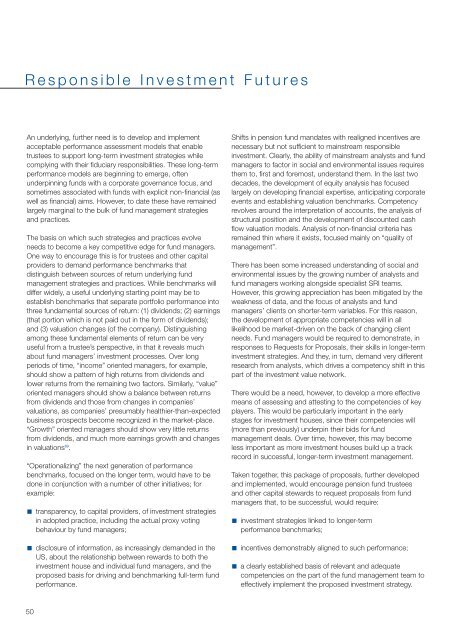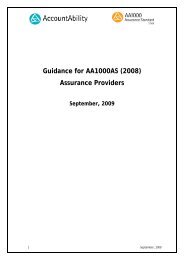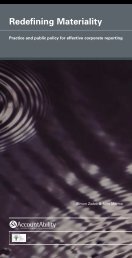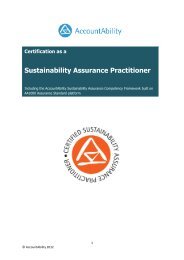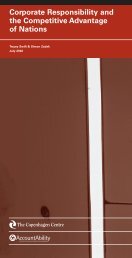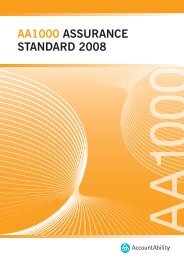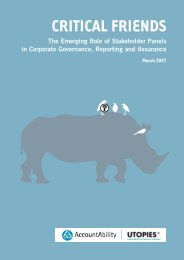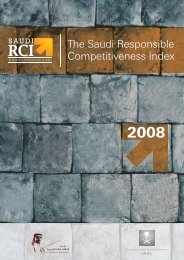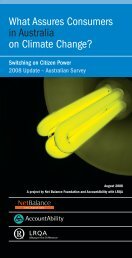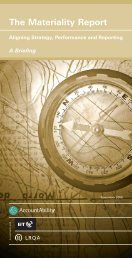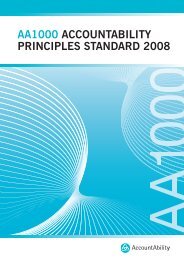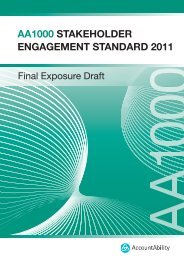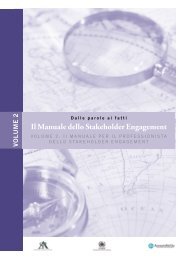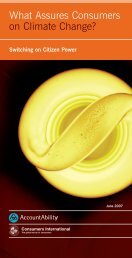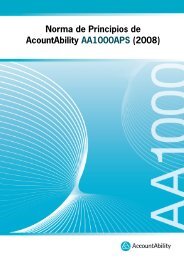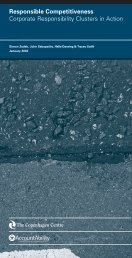Mainstreaming Responsible Investment - AccountAbility
Mainstreaming Responsible Investment - AccountAbility
Mainstreaming Responsible Investment - AccountAbility
You also want an ePaper? Increase the reach of your titles
YUMPU automatically turns print PDFs into web optimized ePapers that Google loves.
<strong>Responsible</strong> <strong>Investment</strong> Futures<br />
An underlying, further need is to develop and implement<br />
acceptable performance assessment models that enable<br />
trustees to support long-term investment strategies while<br />
complying with their fiduciary responsibilities. These long-term<br />
performance models are beginning to emerge, often<br />
underpinning funds with a corporate governance focus, and<br />
sometimes associated with funds with explicit non-financial (as<br />
well as financial) aims. However, to date these have remained<br />
largely marginal to the bulk of fund management strategies<br />
and practices.<br />
The basis on which such strategies and practices evolve<br />
needs to become a key competitive edge for fund managers.<br />
One way to encourage this is for trustees and other capital<br />
providers to demand performance benchmarks that<br />
distinguish between sources of return underlying fund<br />
management strategies and practices. While benchmarks will<br />
differ widely, a useful underlying starting point may be to<br />
establish benchmarks that separate portfolio performance into<br />
three fundamental sources of return: (1) dividends; (2) earnings<br />
(that portion which is not paid out in the form of dividends);<br />
and (3) valuation changes (of the company). Distinguishing<br />
among these fundamental elements of return can be very<br />
useful from a trustee’s perspective, in that it reveals much<br />
about fund managers’ investment processes. Over long<br />
periods of time, “income” oriented managers, for example,<br />
should show a pattern of high returns from dividends and<br />
lower returns from the remaining two factors. Similarly, “value”<br />
oriented managers should show a balance between returns<br />
from dividends and those from changes in companies’<br />
valuations, as companies’ presumably healthier-than-expected<br />
business prospects become recognized in the market-place.<br />
“Growth” oriented managers should show very little returns<br />
from dividends, and much more earnings growth and changes<br />
in valuations 69 .<br />
“Operationalizing” the next generation of performance<br />
benchmarks, focused on the longer term, would have to be<br />
done in conjunction with a number of other initiatives; for<br />
example:<br />
transparency, to capital providers, of investment strategies<br />
in adopted practice, including the actual proxy voting<br />
behaviour by fund managers;<br />
disclosure of information, as increasingly demanded in the<br />
US, about the relationship between rewards to both the<br />
investment house and individual fund managers, and the<br />
proposed basis for driving and benchmarking full-term fund<br />
performance.<br />
Shifts in pension fund mandates with realigned incentives are<br />
necessary but not sufficient to mainstream responsible<br />
investment. Clearly, the ability of mainstream analysts and fund<br />
managers to factor in social and environmental issues requires<br />
them to, first and foremost, understand them. In the last two<br />
decades, the development of equity analysis has focused<br />
largely on developing financial expertise, anticipating corporate<br />
events and establishing valuation benchmarks. Competency<br />
revolves around the interpretation of accounts, the analysis of<br />
structural position and the development of discounted cash<br />
flow valuation models. Analysis of non-financial criteria has<br />
remained thin where it exists, focused mainly on “quality of<br />
management”.<br />
There has been some increased understanding of social and<br />
environmental issues by the growing number of analysts and<br />
fund managers working alongside specialist SRI teams.<br />
However, this growing appreciation has been mitigated by the<br />
weakness of data, and the focus of analysts and fund<br />
managers’ clients on shorter-term variables. For this reason,<br />
the development of appropriate competencies will in all<br />
likelihood be market-driven on the back of changing client<br />
needs. Fund managers would be required to demonstrate, in<br />
responses to Requests for Proposals, their skills in longer-term<br />
investment strategies. And they, in turn, demand very different<br />
research from analysts, which drives a competency shift in this<br />
part of the investment value network.<br />
There would be a need, however, to develop a more effective<br />
means of assessing and attesting to the competencies of key<br />
players. This would be particularly important in the early<br />
stages for investment houses, since their competencies will<br />
(more than previously) underpin their bids for fund<br />
management deals. Over time, however, this may become<br />
less important as more investment houses build up a track<br />
record in successful, longer-term investment management.<br />
Taken together, this package of proposals, further developed<br />
and implemented, would encourage pension fund trustees<br />
and other capital stewards to request proposals from fund<br />
managers that, to be successful, would require:<br />
investment strategies linked to longer-term<br />
performance benchmarks;<br />
incentives demonstrably aligned to such performance;<br />
a clearly established basis of relevant and adequate<br />
competencies on the part of the fund management team to<br />
effectively implement the proposed investment strategy.<br />
50


